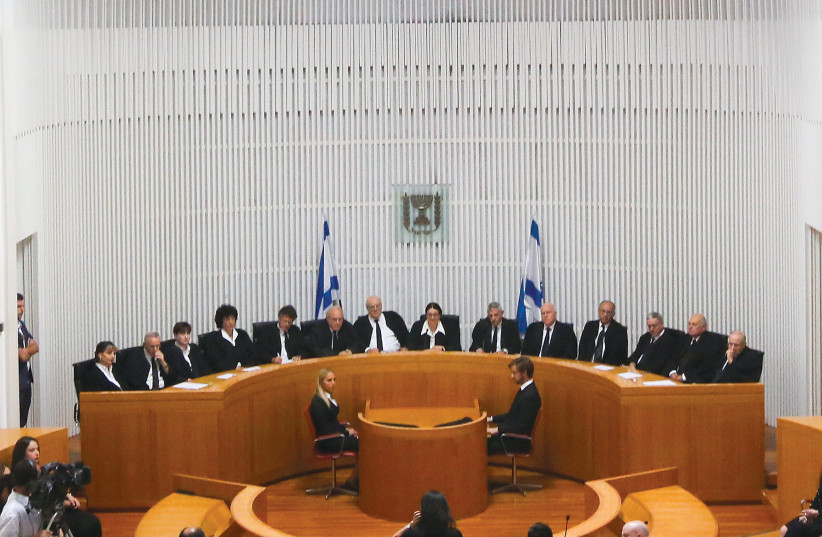The Battle for Israel’s Supreme Court

The madness began when Prime Minister Benjamin Netanyahu’s new government put in play a plan to reform Israel’s judicial system. Kickback against the reforms have sent thousands of Israelis into the streets in protest, including strikes and official warnings that this singular issue might end in modern Israel’s first civil war. All of this in the name of “defending democracy.”
To understand why this is important for supporters of Israel we need to take a brief look at how the Jewish Democracy in Israel works.
Like most democracies there are three branches of government in Israel.
Executive: This is the Prime Minister (today Benjamin Netanyahu) and his majority coalition with at least 61 out of 120 members of Knesset. In general, this branch can be compared to the US president and White House.
Legislative: Israel’s Knesset of 120 members makes the laws of Israel and controls all of the money. The Knesset can be compared to the US Congress.
The role of the Knesset is to represent the interests of the different sectors of the population that voted for them.
Judicial: This is Israel’s Supreme Court. Modern Israel does not have an official constitution because protecting and preserving the “Jewish” nation requires perspectives that would be considered unacceptable to other western democracies.
In its place, Israel has a Basic Law which demands equal justice for all citizens, Arab and Jew.
What’s the problem?
Without a founding document like a constitution (or Torah, as in ancient times) Israel’s democracy leans on the Supreme Court to determine if laws or actions by the Knesset or Prime Minister adhere to the Basic Law.
The issue of the Supreme Court’s ability to judge fairly in Israel is the problem. At the heart of the issue is the question of whether the court’s judges should have the power to strike down laws that they believe to be unconstitutional or unjust.
Netanyahu’s current government with its large number of religious and traditional MKs believe that the court has overstepped its bounds and is interfering with the democratic process by striking down laws that have been democratically passed by the Knesset. They argue that the court is dominated by liberal judges who are out of touch with the values and beliefs of the majority of Jewish Israelis.
Others believe that the court plays a vital role in protecting the rights of minority groups and ensuring that Israel remains a democratic and pluralistic society. They argue that the court’s ability to strike down laws that violate fundamental human rights is an essential check on the power of the Knesset and the government.
The issue has become especially contentious in recent years, as conservative politicians have sought to limit the court’s power and influence. In 2018, for example, the Knesset passed a law that allowed it to override Supreme Court decisions in certain cases, a move that was widely criticized by human rights groups and opposition politicians.
The plan
Minister of Justice Yariv Levin’s plan to reform Israel’s judicial system includes the proposal for a “Supremacy Clause.” The proposal passed in its first reading this week, and would allow the Knesset to override Supreme Court rulings with a simple majority vote.
Critics argue that this would undermine the checks and balances that are crucial to maintaining a healthy democracy, and could lead to a situation where the government can act with impunity and ignore the rule of law.
In addition, the proposal has been criticized for being politically motivated, as it is seen as an attempt by the current right-leaning conservative government to consolidate power and silence opposition.
Supporters of the proposal argue that it is necessary to restore balance to the relationship between the Knesset and the Supreme Court, and to ensure that the court does not overstep its authority by striking down laws that are democratically enacted by the people’s representatives in the Knesset.
Selecting judges
In Israel, Supreme Court justices are selected by a committee known as the Judicial Selection Committee, which is made up of nine members. The committee includes three sitting Supreme Court justices, two representatives of the Israeli Bar Association, two representatives of the Knesset, and two cabinet ministers (one of whom is the Minister of Justice, Yariv Levin).
The committee operates independently of the government and is designed to ensure that the appointment process is based on merit and is free from political influence.
Levin proposes to reform the committee in a way that would give the executive branch greater control over the appointment process by giving the government a majority of the seats on the committee.
Critics of this proposed reform argue that it would undermine the independence of the judiciary and could lead to the appointment of judges who are loyal to the government rather than to the principles of justice and the rule of law. Proponents of the reforms argue that they are necessary to ensure that the judiciary is aligned with the priorities of the government and the people.
No comments:
Post a Comment